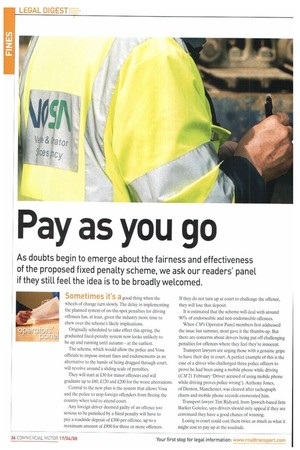Pay as you go
Page 36

If you've noticed an error in this article please click here to report it so we can fix it.
As doubts begin to emerge about the fairness and effectiveness of the proposed fixed penalty scheme, we ask our readers' panel if they still feel the idea is to be broadly welcomed.
Sometimes its a good thing when the wheels of change turn slowly. The delay in implementing the planned system of on-the-spot penalties for driving offences has, at least, given the industry more time to chew over the scheme's likely implications.
Originally scheduled to take effect this spring, the graduated fixed-penalty system now looks unlikely to be up and running until autumn — at the earliest.
The scheme, which would allow the police and Vosa officials to impose instant fines and endorsements as an alternative to the hassle of being dragged through court, will revolve around a sliding scale of penalties.
They will start at £30 for minor offences and will graduate up to £60, £120 and £200 for the worst aberrations.
Central to the new plan is the system that allows Vosa and the police to stop foreign offenders from fleeing the country when told to attend court.
Any foreign driver deemed guilty of an offence too serious to be punished by a fixed penalty will have to pay a roadside deposit of £300 per offence, up to a maximum amount of £900 for three or more offences. If they do not turn up at court to challenge the offence, they will lose that deposit.
It is estimated that the scheme will deal with around 90% of endorseable and non-endorseable offences.
When CM'S Operator Panel members first addressed the issue last summer, most gave it the thumbs-up. But there are concerns about drivers being put off challenging penalties for offences where they feel they're innocent.
Transport lawyers are urging those with a genuine gripe to have their day in court. A perfect example of this is the case of a driver who challenged three police officers to prove he had been using a mobile phone while driving (CM 21 February 'Driver accused of using mobile phone while driving proves police wrong'). Anthony Jones, of Denton, Manchester, was cleared after tachograph charts and mobile phone records exonerated him.
Transport lawyer Tim Ridyard, from Ipswich-based firm Barker Gotelee, says drivers should only appeal if they are convinced they have a good chance of winning.
Losing in court could cost them twice as much as what it might cost to pay up at the roadside.




























































































































































































